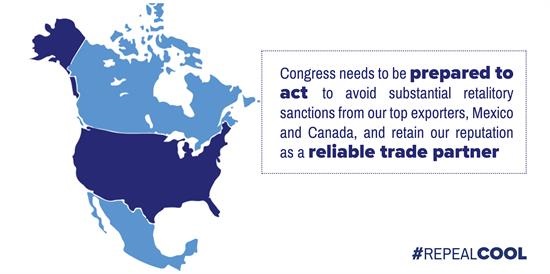
Agricultural News
House Ag Committee Offers 10 Things to Know About COOL
Tue, 12 May 2015 12:01:32 CDT
 In the coming days, the World Trade Organization (WTO) is expected to release its fourth and final decision on the U.S. Country of Origin Labeling (COOL) rule and announce if the United States has been found compliant with trade standards. Should the U.S. lose this appeal, Congress will need to be ready to avoid retaliation from Canada and Mexico, our top two export markets. Here are 10 things you should know about COOL.
In the coming days, the World Trade Organization (WTO) is expected to release its fourth and final decision on the U.S. Country of Origin Labeling (COOL) rule and announce if the United States has been found compliant with trade standards. Should the U.S. lose this appeal, Congress will need to be ready to avoid retaliation from Canada and Mexico, our top two export markets. Here are 10 things you should know about COOL.
1. COOL is not about food safety or traceability.
The U.S. Department of Agriculture's Agricultural Marketing Service (AMS), which enforces COOL, has repeatedly stated that, "the COOL program is neither a food safety or traceability program, but rather a consumer information program."
2. COOL is costly for producers, retailers, and consumers.
According to AMS, the first year-incremental costs for growers, producers, processors, wholesalers, and retailers are $2.6 billion. Furthermore, the estimated cost to the United States' economy in higher food prices and reduced food production in the tenth year after implementation of the rule is $211.9 million.
3. There is no increase in consumer demand for origin labeling information as a result of COOL.
According to a study by Kansas State University, there is no evidence of a demand increase in beef, pork or chicken products when the COOL label is present. Other economic and academic studies show no evidence mandatory country of origin labeling in the U.S. retail meat markets has increased consumer demand. Click here to read the study.
4. Consumers interested in country of origin information are not willing to pay more for it.
Most consumers who preferred COOL in a consumer study interpreted the program to provide them with additional food safety assurances and enough traceability information to allow a meat product to be completely traced back to the farm of origin. Mandatory COOL is no more than a food-labeling program and only allows identification of a meat product's country of origin by stage of production. Across a multitude of evaluations, no evidence of a change in demand following implementation of COOL was found.
*Source: American Agricultural Economics Association. Click here to read the report.
5. The World Trade Organization (WTO) has ruled against the U.S. three times.
In December 2008, Canada and Mexico requested consultations with the U.S. on COOL regulations that were scheduled to go into effect in January 2009. In two instances (2011 and 2012), the WTO found that the way U.S. COOL regulations were implemented violated our trade obligations by discriminating against imported livestock. The U.S. was given until May 2013 to bring COOL regulations into compliance. The USDA issued a revised COOL rule in May 2013 and once again Canada and Mexico claimed the revised rule did not bring the U.S. into compliance and that it was more burdensome than the original rule. The WTO ruled against the U.S. for the third time, stating the that the amended COOL measure increases the original COOL measure's detrimental impact on the competitive opportunities of imported livestock in the U.S. market, because it necessitates increased segregation of meat and livestock according to origin. The U.S. appealed the decision and the WTO is expected to reveal its fourth and final decision mid-May.
6. Canada and Mexico are expected to retaliate should the WTO rule against the U.S. in the coming days.
Both Canada and Mexico have stated they will retaliate against the U.S. if the WTO finds the United States non-compliant. In 2013, Canada released a retaliation list of products imported from the U.S. that may be targeted in response to the U.S.'s failed attempt to comply with the WTO ruling on COOL. Mexico has not yet released a retaliation list, but previous retaliatory action by Mexico hurt a broad spectrum of American businesses. Click here for the retaliation list.
7. Retaliation could hurt much more than just the agriculture industry.
Everything from California wine, Arizona apples, Michigan corn, and Louisiana rice could be affected by retaliation from Canada and Mexico. Various U.S. products and commodities could become subject to large tariffs making it difficult for producers to earn a profit. For example, Texas could face tariffs on $9.2 billion worth of exports on beef, spirits, machine parts, and prepared foods. Click here to see specific data on your state.
8. U.S. trade relationships could be damaged as a result of COOL.
The U.S. could face substantial retaliatory sanctions from Canada and Mexico on a wide variety of commodities and products, lose its reputation as a reliable trade partner, and U.S. businesses could lose valuable partnerships with Canadian and Mexican businesses.
9. Congress must be prepared to act quickly.
If the WTO finds the U.S. non-compliant for the fourth time, Congress will need to act within days of the decision to avoid retaliation and retain the valuable relationship with Canada and Mexico, the U.S.'s top two export markets.
10. More than 100 American and international businesses and organizations do not support COOL.
The COOL Reform Coalition consists of over 100 American and international businesses and organizations that will be affected if the U.S. is found non-compliant for the fourth time as a result of COOL.
WebReadyTM Powered by WireReady® NSI
Top Agricultural News
More Headlines...




















